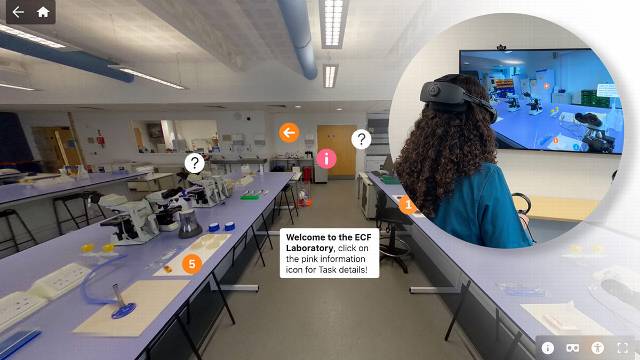
Feeding the nation is no easy feat, especially when trying to improve practises to make agricultural work more sustainable while producing better results for the farmer and consumer alike. Being considerate of the world around us was highlighted earlier this year by the new Agriculture Bill, seeing an increased focus on protection of soil, water and the wider environment. Motivated by these changes, students are researching new and improved ways to farm in line with new guidance. We spoke to Jess Baulch, a BSc (Hons) Geography and Environmental Management final year student about her current Honors Research Project and how she hopes to make a difference to the sector.
"Growing up on a dairy farm I’ve always been involved in farming but gave little consideration to the environmental consequences caused by our industry,” explained Jess. “Following work experience with Rothamsted Research, I developed an interest in environmental management and decided to pursue my education in this sector further.
Having explored all of her higher education options, Jess returned to Harper, knowing this was the place she wanted to study. Jess said: “I chose to study my degree at Harper for the broad range of environmental topics covered and the integration of an agricultural perspective.”
Combining the study of agriculture with a wider ecological stance, Jess was able to follow her interest in environmental management. Learning a variety of practical and theoretical skills, Jess’ final year study is reflective of the passion she had from the start put into practise with the knowledge she has gained through her degree.
Jess commented: “Coming from a farming background I understand the difficulties in trying to maintain a viable business while protecting the environment.
“Whilst on my placement year I was involved in supporting agricultural consultants to give farm advice on how to reduce pollution to air and water. There is an increasing focus on reducing ammonia emissions from agriculture, following the UK Government’s publication of the Clean Air Strategy (2019). The loss of ammonia into the environment has significant consequences for biodiversity, human health and future agricultural production.
“This is one of the reasons I am researching ammonia mitigation, focusing on livestock farmers in the southwest as part of my final year dissertation. My study aims to gain an understanding of the current levels of ammonia mitigation on farms, and the motivations and obstacles associated with this uptake.”
From her research so far, Jess explained her findings: “Despite some confusion over the impacts of ammonia, initial findings indicate farmers want to protect and enhance the natural environment. Almost 70% of farmers surveyed would consider changing their farming practices to alternatives that produce lower emissions. The key restricting factor however is cost, with most respondents (72%) believing that the Government should do more to encourage and help this change. I hope to take the results from my research into the industry to help farming practices become more sustainable.”
With this in mind, Jess spoke about her future ambitions: “My placement year with ADAS confirmed that I want to pursue a career in agri-environmental consultancy, helping farmers achieve the most from their business whilst enhancing the natural environment around them.”
As policies continue to change, our student body will become the future of farming, helping to direct legislation to more sustainable practices that will benefit all. In studying an environmental degree, Jess advocates for others to do the same to be a thought leader in this area.
Jess shared her thoughts, saying: “With the environment becoming a more influencing factor in business decision making there are many great opportunities for those studying land-based degrees. My main advice to other students is to participate and make the most of any experience available as this will help you develop a variety of new skills."
If you are interested in finding out more about environment and land-based degrees with Harper Adams, check out our undergraduate courses here. For more information, you can speak to a student or staff member about university life and courses through the link below.
Ask Me
 Blog: Veterinary Medicine students step into immersive 360° laboratory
At Harper & Keele Veterinary School, students are stepping beyond the traditional microbiology bench and into an immersive 360° labo …
Posted
Yesterday
Blog: Veterinary Medicine students step into immersive 360° laboratory
At Harper & Keele Veterinary School, students are stepping beyond the traditional microbiology bench and into an immersive 360° labo …
Posted
Yesterday





